We are smack in the middle of a holiday week, and you know what holiday weeks mean: reading giant fat books that we don’t usually have time for! We here at Tor.com love giant fat books, so we took to Twitter to ask you about some of your favorite scientific non-fiction, and you came back with a wonderful variety of suggestions. I’ve collected ten of them here, and I would love it if you pepper the comment thread with even more! There’s nothing quite like charging into a new year armed with giant fat erudition.
Biographical Encyclopedia of Science and Technology—Isaac Asimov
 I’m pretty sure Isaac Asimov was the internet before there was an internet. He just had all the knowledge of humanity stored away in his noggin, and sometimes he would sit down and write some of it down in book form for the rest of us to read. One of these books was his enormous, occasionally-updated Encyclopedia, which provided short bios of everyone (and I mean everyone) from Imhotep to Tycho Brahe to Stephen Hawking, in chronological order.
I’m pretty sure Isaac Asimov was the internet before there was an internet. He just had all the knowledge of humanity stored away in his noggin, and sometimes he would sit down and write some of it down in book form for the rest of us to read. One of these books was his enormous, occasionally-updated Encyclopedia, which provided short bios of everyone (and I mean everyone) from Imhotep to Tycho Brahe to Stephen Hawking, in chronological order.
The Day We Found the Universe—Marcia Bartusiak
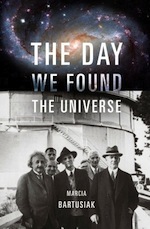
Science writer and MIT professor Marcia Bartusiak writes a detailed, humanities-major-friendly book about the beginnings of modern astronomy. In 1925 Edwin Hubble released his finding that the universe was expanding, which set off a storm of research and theorizing from Albert Einstein, Heber D. Curtis, Henrietta Leavitt, Harlow Shapley, and George E. Hale. By focusing on the scientists’ personalities as well as their work, she brings this exciting period to life.
Religion Explained—Pascal Boyer
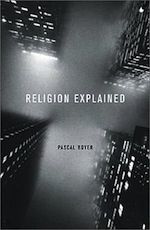 Anthropologist Pascal Boyer looks at the anthropological, linguistic, and psychological roots of religious feeling. He focuses especially on how the particular structure of the human brain allows us to have religious theories in the first place, and why humans have multiple different religions rather than simply one. This book is a bit dry, but it is a fascinating way of thinking about humanity’s beliefs and appetite for the supernatural.
Anthropologist Pascal Boyer looks at the anthropological, linguistic, and psychological roots of religious feeling. He focuses especially on how the particular structure of the human brain allows us to have religious theories in the first place, and why humans have multiple different religions rather than simply one. This book is a bit dry, but it is a fascinating way of thinking about humanity’s beliefs and appetite for the supernatural.
Guns, Germs, and Steel—Jared Diamond
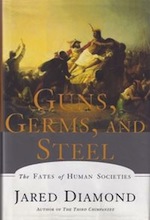 Jared Diamond argues that geography and environment influenced early civilization’s development more than previously thought, and that human’s ability to use the animals and plants around them were what gave some cultures more strength than others. Agricultural breakthroughs led to writing, religious practices, and weapons production, which in turn allowed those cultures to conquer. Diamond’s work runs counter to the biological theory, and gives us a great look at our past.
Jared Diamond argues that geography and environment influenced early civilization’s development more than previously thought, and that human’s ability to use the animals and plants around them were what gave some cultures more strength than others. Agricultural breakthroughs led to writing, religious practices, and weapons production, which in turn allowed those cultures to conquer. Diamond’s work runs counter to the biological theory, and gives us a great look at our past.
The Eerie Silence—Paul Davies
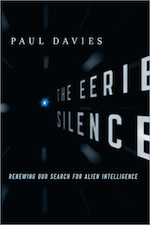 Are we alone in the universe? Is there more life out there, and will we recognize it if we find it? Cosmologist Paul Davies, (Erdos Number: 3; Asteroid: “6870 Pauldavies.”) who has been involved with SETI for thirty years and chairs the SETI Post-Detection Taskgroup, challenges the anthropocentric view that has dominated our search for alien life, and argues that we need to look for alien intelligence in new ways, rather than assuming that the ultimate Other will be just like us.
Are we alone in the universe? Is there more life out there, and will we recognize it if we find it? Cosmologist Paul Davies, (Erdos Number: 3; Asteroid: “6870 Pauldavies.”) who has been involved with SETI for thirty years and chairs the SETI Post-Detection Taskgroup, challenges the anthropocentric view that has dominated our search for alien life, and argues that we need to look for alien intelligence in new ways, rather than assuming that the ultimate Other will be just like us.
The Demon-Haunted World: Science as a Candle in the Dark—Carl Sagan, Ann Druyan
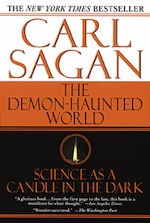 We miss the hell out of Carl Sagan. In this classic book from 1997, the renowned astronomer argued for the use of rationality and reason in all areas of life, and worried that pseudoscience was pulling humanity backwards. He looked at long-debunked superstitions like witchcraft and demonic possession, and talked about the scientific inquiry that disproved them. Then, more disturbingly, he turned the same critical thinking on our modern world, which is willing to embrace stories of alien abduction, faith healing, and hauntings.
We miss the hell out of Carl Sagan. In this classic book from 1997, the renowned astronomer argued for the use of rationality and reason in all areas of life, and worried that pseudoscience was pulling humanity backwards. He looked at long-debunked superstitions like witchcraft and demonic possession, and talked about the scientific inquiry that disproved them. Then, more disturbingly, he turned the same critical thinking on our modern world, which is willing to embrace stories of alien abduction, faith healing, and hauntings.
Sex at Dawn: How We Mate, Why We Stray, and What It Means for Modern Relationships—Christopher Ryan, Cacilda Jetha
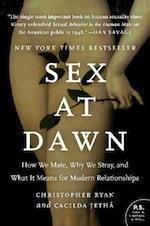 Do humans need monogamy? Do men and women today still want to adhere to the old exchange of male protection for female fertility? Christopher Ryan and Cacilda Jethá delve into the history of human sexuality, as well as the habits of our primate cousins, to examine why traditional heterosexual relationships became the norm, and to theorize about how human sexuality will change in the future.
Do humans need monogamy? Do men and women today still want to adhere to the old exchange of male protection for female fertility? Christopher Ryan and Cacilda Jethá delve into the history of human sexuality, as well as the habits of our primate cousins, to examine why traditional heterosexual relationships became the norm, and to theorize about how human sexuality will change in the future.
The Ghost Map: The Story of London’s Most Terrifying Epidemic—and How It Changed Science, Cities, and the Modern World—Steven Johnson
In 1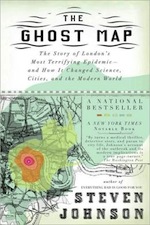 854, London was on the cusp of becoming one of the World’s first modern cities. Their infrastructure couldn’t keep up with their population, however, and when a cholera outbreak struck, it proved a threat to the population. Steven Johnson tells us the story of John Snow, the doctor who raced to find a cure for the most terrifying disease of his time. Johnson uses the story of the outbreak to look at the rise of cities and the ways scientific inquiry shaped modernity.
854, London was on the cusp of becoming one of the World’s first modern cities. Their infrastructure couldn’t keep up with their population, however, and when a cholera outbreak struck, it proved a threat to the population. Steven Johnson tells us the story of John Snow, the doctor who raced to find a cure for the most terrifying disease of his time. Johnson uses the story of the outbreak to look at the rise of cities and the ways scientific inquiry shaped modernity.
The Better Angels of Our Nature: Why Violence Has Declined —Steven Pinker
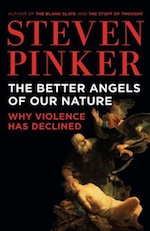 Is humanity inherently violent? Does the modern age drive us all to levels of aggression that our foreparents would find unthinkable? Harvard psychology professor Steven Pinker looks at the history of violence, and argue that, despite what the 24-hour-news-cycle would have us believe, humans are actually becoming less vicious, and we’re currently living in an era of relative peace. This book offers a hopeful view of human nature, backed up with many, many pages of multidisciplinary research.
Is humanity inherently violent? Does the modern age drive us all to levels of aggression that our foreparents would find unthinkable? Harvard psychology professor Steven Pinker looks at the history of violence, and argue that, despite what the 24-hour-news-cycle would have us believe, humans are actually becoming less vicious, and we’re currently living in an era of relative peace. This book offers a hopeful view of human nature, backed up with many, many pages of multidisciplinary research.
Catching Fire: How Cooking Made Us Human—Richard Wrangham
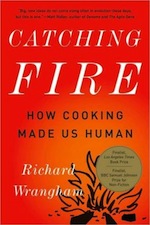 Primatologist Richard Wrangham gives us nothing less than an alternative theory of evolution in Catching Fire. He posits that our ancestors only truly became humans once they started cooking food. Cooking food let to a burst of growth in the human brain, while a shared hearth led to a new era of domestication and emphasis on pair bonding and family. Wrangham uses his research to give us a new angle on how humans became the social, intelligent, food-loving species we are today.
Primatologist Richard Wrangham gives us nothing less than an alternative theory of evolution in Catching Fire. He posits that our ancestors only truly became humans once they started cooking food. Cooking food let to a burst of growth in the human brain, while a shared hearth led to a new era of domestication and emphasis on pair bonding and family. Wrangham uses his research to give us a new angle on how humans became the social, intelligent, food-loving species we are today.
Oh, and I pulled that top image of Carl Sagan and Isaac Asimov from this fascinating article. Go read that, too!
Leah Schnelbach is currently enjoying Brian Jay Jones’ biography of Jim Henson. It may not be scientific non-fic, but it contains Muppets, so it wins.










I recently read Gulp by Mary Roach and COULD NOT STOP trying to talk with my family and friends about it for the next several days (particularly while eating.) Great book about the digestive system. Perhaps a little light, science-wise, but full of interesting facts and extremely readable. Made me laugh out loud all the time while reading. I’ve heard good things about Stiff (dead bodies) and Bonk (sex), too, but haven’t read them yet.
Re The Ghost Map: there’s a typo. 1854, not 1584.
Asimov’s Atom was an excellent read as well.
Awesome! A couple weeks ago i found Jared Diamond´s “Guns, germs, and Steel” at a ridiculously low price in a bookshop in my city. And when i say ridiculously cheap, i say ridiculously cheap. I haven´t started reading it yet, but i read Diamond´s Collapse a couple years ago, so it must be a good book. And it´s included here: that´s good!
A Farewell to Alms by Gregory Clark.
All these look interesting. I’ll add all of them (other than the Asimov which isn’t currently available) to my Kindle Wish List. (Of course, now that we’re entering nomination season, my purchases may be limited to SF for the next few months.)
In Guns, Germs and Steel, Diamond takes a nifty hypothesis that would make a good sized Scientific American article, and stetches it out to book length. As an alternative I suggest his earlier book, The Third Chimpanzee, which I thought was a much more engaging read. He offers up his hypothesis of biogeography shaping cultural destiny, but in a more proper single chapter length. He also explores other facets of human behavior that perhaps define us as a species, as well as our relationship with our closest primate cousins. Be advised that in both books he shows such affection for the language and cultures on New Guinea that he comes across as a bit fawning.
I second Mary Roach, as fascinating reading.
I suggest almost anything by Simon Winchester. His books include The Day the World Exploded (about the explosion of the Krakatoa volcano). Erik Larson is another interesting author; he wrote about the first American serial Killer (The Devil in the White City, set at the World Fair), and Isaac’s Storm, about the hurricane that devestated Galveston in 1900.
Michio Kaku’s Parallel Worlds, absolutely. One of my favorite books, ever. I would read a chapter, and sit there just staring out the window and thinking woooooowwwwwww.
@6
Agreed, the middle section of GGS on domestication and agricultural spread definitely dragged on a lot. He also got the Moriori section a bit wrong, tending towards theories discredited in the 70s and 80s.
On the other hand, I found the linguistic and sociological exploration in the third section absolutely fascinating, especially with regards to Madagascar being settled from Asia, not Africa.
For a book with such a broad scope, it has a pretty good strike rate in terms of accuracy, and was a worthy recipient of a Pulitzer.
It also spurred a lot of research into areas that could “prove him wrong” which has led to a much better understanding today.
I read it with an eye to it being a 90s book, and don’t quibble over the fallacies, they aren’t huge.
I found Gulp to be full of not-funny humor that added nothing to the topic being discussed.
One of my favorite books on a science topic is Beak of the Finch, which covers evolution, observable and observed among Galapagos finches in real time. It helped me understand the mechanics of evolution better than I had before reading it. Highly recommended.
@7: And speaking directly to the topic, there’s also Larson’s “Thunderstruck,” which features Marconi and Tesla.
Another favorite read of mine was John Gribbin’s “The Scientists: A History of Science Told Through The Lives of Its Greatest Inventors.”
Thanks for the list of great nonfiction. I am a high school science teacher and have adapted some primary source, maritime books for Google Earth chapter touring. It’s a fun, multidisciplinary way for students to explore science, history and geography at: http://Sailthebook.net
Feel free to use/share the material.
I have to put my hand up for the beautifully written, endlessly fascinating “Mutants: On Genetic Variety and the Human Body” by Armand Marie Leroi. The glimpse the author gives us of the complexity of human growth and development is awe-inspiring; I came away amazed that ANY of us end up relatively ‘normal’ (and by that I mean that we fall somewhere within the vast spectrum of ‘normality’). Highly recommended.
Interesting that Ghost Map was the Johnson book chosen. He’s written several good ones but I think Where Good Ideas Come From was much better.
And I can’t believe that Bill Bryson’s A Short History of Nearly Everything didn’t make the list! It was highly readable both in book and audio format.
I would add Zero: The Biography of a Dangerous Idea by Charles Seife to the list. A great history of mathematical thought and you don’t have to be current on calculus to understand it (although it helps). The Doctor’s Plague by Sherwin Nuland is also good, about puerperal fever.
And I’m off to add to my TBR pile…